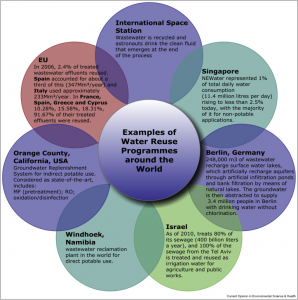Sustainable Wastewater Treatment & Reuse in the Age of Covid-19.

Due to vulnerability to water stress and drought conditions, commercial & industrial companies are taking control of their water management. This is accompanied by an increased investment in water recycling to reduce operational risk by focusing on sustainability wastewater treatment through decentralized recycling solutions.
Industrial facilities typically consume the highest volume of water, accounting for about 86-87 percent of the U.S. freshwater supply requirements. Therefore, as these companies look to become more sustainable by reducing their usage of freshwater, onsite wastewater reuse solutions and partnerships with municipalities to utilize their secondary/tertiary wastewater resources will increasingly play a role into the future.
Securing water that is exempt from drought-related or environmental cutbacks or usage regulations is essential for industrial organizations will highlight these firm’s environmental efforts. It is anticipated that industrial applications for reclaimed municipal wastewater is expected to grow 72 percent over the next 5-7 years. Power plants, upstream oil and gas players, paper mills, chemical manufacturing and refineries have been the biggest opportunities for reclaimed wastewater to this point. However, new industries including technology companies and food/beverage companies are realizing recycling water is worth the investment.
Continuing evolving regulations will support more rapid water recycling market growth and encouragement at a legislative level especially through support by local and national environmental protection agencies will also be a key contributing factor to further adoption of water reuse strategies within industrial facilities across the globe.
What are the implications of corona viruses including Covid-19 on sustainable wastewater treatment & reuse within industrial and municipal wastewater facilities.
Do water recycling and wastewater treatment plants treat COVID-19?
Yes, according to the US EPA wastewater and water recycling treatment plants treat viruses and other pathogens. COVID-19, is a type of corona virus that is particularly susceptible to disinfection. Treatment and disinfectant processes at these plants are expected to be effective to treat these viruses.
Can personnel contract COVID-19 from wastewater or water recycling plants?
The World Health Organization (WHO) has indicated that “there is no evidence to date that COVID-19 virus has been transmitted via wastewater recycling systems, with or without sustainable wastewater treatment.”
Should recycled water and wastewater workers take extra precautions to protect themselves from the virus that causes COVID-19?
No, according to the US centers for disease control (CDC), standard practices associated with wastewater and water reuse treatment plant operations should be sufficient to protect wastewater treatment workers from viruses including COVID-19.
These standard practices can include administrative and engineering controls, hygiene precautions, specific safe work practices, and personal protective equipment (PPE) normally required when handling untreated wastewater. No additional COVID-19 specific protections are recommended for workers involved in recycled water or wastewater management, including those at wastewater treatment facilities.
Want to learn more about the latest sustainable wastewater treatment & reuse solutions for your facilities? Contact the water & wastewater treatment experts at Genesis Water Technologies, Inc. +1 877 267 3699 or reach out to us via email at customersupport@genesiswatertech.com to discuss your specific application

